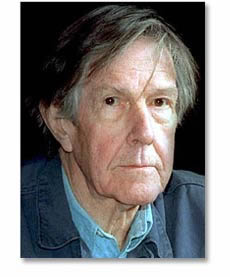|
John Cage
 Why is Style such a source of fascination? Precisely because it is hard to put into words. Style does not need to be the point of departure for a composer, although many do use it as their launch pad. Why is Style such a source of fascination? Precisely because it is hard to put into words. Style does not need to be the point of departure for a composer, although many do use it as their launch pad.
Some people don’t understand why the music I started to write after Block Beuys appears to be at odds with my earlier work. They often ask how much John Cage still affects me, as they no longer hear his influence.
But that is only skin-deep. If you look at the content of my music that aspect is still there. Especially as Cage never started from Style. He was more concerned about creating work based on a set of rules. Inevitably, the end result will fit with a particular style. But Style is merely the destination, terra incognita. During the process of composition the work starts to lead a life of its own. Once it is finished it may turn out to contain elements that are reminiscent of something else. For instance, from time to time the harmonies in Riflesso sull’acqua bear a likeness to Messiaen.
Another important Cage-like aspect that characterizes the way I compose is that I don’t think dogmatically. At least, I try not to. I do not have a law book that stops me from doing things. Because my compositions take off from numbers and magic squares, a dissonant chord might end up getting juxtaposed with a tonal chord. Within a post-serial framework that tonal chord would be axed. But not in my case.
Cage visited The Hague when I was in my sixth year of Conservatoire, precisely when I thought: “I think that, as a composer, I amount to something.” Cage just blew me away. Until then I had been focussing on laws of composition: my teacher Jan van Vlijmen believed rules for atonal counterpoint existed. Then Cage turned up. Soon after I decided to compose the parts for my radio play Radio I one by one without connection. The harmonies that evolved were not intentional, the result of combining independently created musical lines. In the end, it sounded just fine.
Actually, Cage arrived at a dramatic moment, around the time I had my final exams. There was a clear diverging of opinions at the conservatoire. Some of my fellow students refused to subject themselves to Cage, they rejected his way of thinking. I, on the other hand, accepted him. The result was that I banged my head against a brick wall for six years. For a while I even wondered whether to give up composing altogether.
Cage can do that to you, because he raises such fundamental issues. In a way he says: you actually do not need to compose anything at all. You might just as well sit down in a park and listen to a symphony of birdsong, ambulances, ghetto blasters, and other environmental sounds. And then he composed 4’33’’. A piece that does not contain silence but all sounds that can be heard at that precise moment — as a composer, where can you go from there?
Like Cage, I think that every individual has his or her own responsibilities. If everyone was aware that they are responsible for their own actions, this planet would be a very different place. The world is full of people telling others what they should do and how they should think.
To me that is a Zen Buddhist tenet — during your entire life you are first and foremost accountable to yourself. Another aspect of Zen Buddhism is to try not to indulge in egocentric ways of thinking. One is not the centre of the universe. Instead you have to become aware that you are but a conceited creature, surrounded by utter chaos.
|